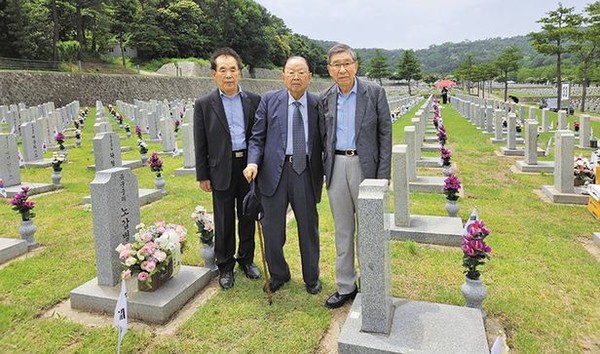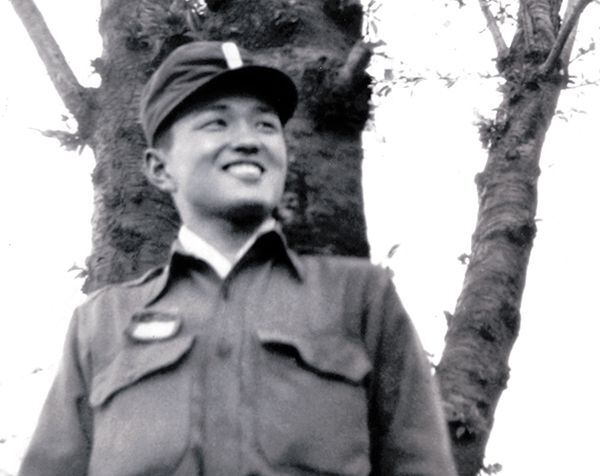He was a high school freshman when the Korean War broke out. During the war, I entered a military academy that trained officers. At first, I was too young. I raised my age by three years and changed my ID to 18. The competition out I got in.
I was only 15 years old, and the war was brutal. There was no time for bloodshed, and Seoul quickly fell under communist rule. I was holding my breath, but the Peoples’s Army took me away. I managed to escape from the Hyochang Stadium where we were we were being held. Seoul was quickly restored, but the joy was shorted-lived. He learned that the Chinese had reached Osan, and he decided to become officer in the Korean National Army rather than be captured again.

After being commissioned, I was assigned to the Quartermaster Department, and three months later I was transferred to the infantry and assigned to Sokcho as part of our agents on a boat to infiltrate the rear areas of North Korea, including Sinpo. We took them to the North Korean coast and then our operatives switched to rubber boats and infiltrate.
One day, an officer came by and asked what time the operation was. Without thinking about it, I told him it was dawn tomorrow. As usual, we dropped off the agents somewhere in Sinpo, and that were wiped out under crossfire from the Communist. I barely escaped.

I later found out that the officer was a double agent. Several of the guards who assisted me were also from the People’s Army. I joined the National Army for one reason. The food was better.
I spent mt teenage years on the battlefield. I was discharged immediately after the war and rushed to rebuild the country from the ruins. He founded the Korean Peninsula, spearheaded its export, and served on the 1988 Olympic bid committee. He helped organize the 2002 World cup bid.
The gap between South Korean and an elderly as seen through the eyes of a high school student is far greater than the 70-year time difference. The 15-year-old saw only the urgency of surviving the war and the need to put food on the table.
Nevertheless. I believe that today’s Korea exists because of the bold challenge of pinning hope on a single ray of sunlight against a dark sky after the war.
First of all, we live in a world where everything is taken for granted. Nowadays, if you say, “I owe my country to the sacrifices of those who came before me,‘ you’ll called an idiot.
Most of us go to the national cemetery to pay our respects to those who have gone before us on Memorial Day, a day odd from work. I haven’t missed a day in the last 70 years. Of the more than 7300 men who served, more than 1300 were killed in action, and that’s why I live my life putting the interest of my country before my own.
It doesn’t have to be this way for everyone. They just to do their best in their positions and make meaningful progress. They are the ‘silent heroes’ who support our society. Following the rules we make for ourselves also makes us matures. People Who don’t litter, obey traffic signals, don’t inconvenience others, eliminate drunk driving, care for the weak, and accept differences are the citizens of advanced countries.
Nevertheless, we are dismayed by the recent cases of Korean public servants starting their own companies and pursuing interests, and lawmakers engaging in unethical transactions. In additions, the extreme individual selfishness conflict and disputes in all walks of life, people’s indifference to North Korean espionage, the messy battles in the National Assembly and among politicians, the gap between the contribution among large corporation are issues that our society still needs to solve after more than 70 years.
Now, Korean must build a better future by capitalizing on the sacrifices made by the Hoguks. There is only one thing I would like say to an old man of 90.“Thanks you for your hard work. Now, Korea, stand tall.”
Chang Chi-hyuk, former Chairman of KOHAP.
Chang Chi-hyuk(91), former chairman of Gohap Group, was born as the son of independence activist Chang Dobin. He founded Gohap in 1966 and rose to become the 16th richest man in Korea.
As a displaced person from North Pyongan Province, he was interested in business in North Korea, and in the 1990s, he pushed for the development of Mount Kumgang and the passage of a Russian natural gas pipeline through North Korea. In 1963, he Young-sam and served as chairman of the Special Committee on the Inter-Korean Corridor in the All-Korea Federation.

